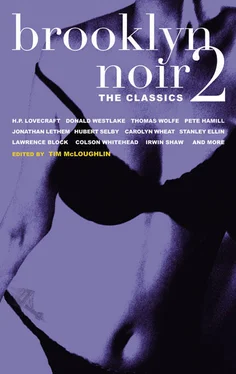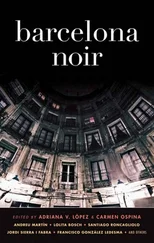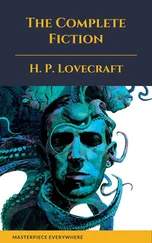H. Lovecraft - Brooklyn Noir 2
Здесь есть возможность читать онлайн «H. Lovecraft - Brooklyn Noir 2» весь текст электронной книги совершенно бесплатно (целиком полную версию без сокращений). В некоторых случаях можно слушать аудио, скачать через торрент в формате fb2 и присутствует краткое содержание. Год выпуска: 2005, ISBN: 2005, Издательство: Akashic Books, Жанр: Детектив, на английском языке. Описание произведения, (предисловие) а так же отзывы посетителей доступны на портале библиотеки ЛибКат.
- Название:Brooklyn Noir 2
- Автор:
- Издательство:Akashic Books
- Жанр:
- Год:2005
- ISBN:978-1888451764
- Рейтинг книги:4 / 5. Голосов: 1
-
Избранное:Добавить в избранное
- Отзывы:
-
Ваша оценка:
- 80
- 1
- 2
- 3
- 4
- 5
Brooklyn Noir 2: краткое содержание, описание и аннотация
Предлагаем к чтению аннотацию, описание, краткое содержание или предисловие (зависит от того, что написал сам автор книги «Brooklyn Noir 2»). Если вы не нашли необходимую информацию о книге — напишите в комментариях, мы постараемся отыскать её.
Brooklyn Noir 2 — читать онлайн бесплатно полную книгу (весь текст) целиком
Ниже представлен текст книги, разбитый по страницам. Система сохранения места последней прочитанной страницы, позволяет с удобством читать онлайн бесплатно книгу «Brooklyn Noir 2», без необходимости каждый раз заново искать на чём Вы остановились. Поставьте закладку, и сможете в любой момент перейти на страницу, на которой закончили чтение.
Интервал:
Закладка:
“And he was a writer, wasn’t he? At least, he was trying to be a writer.”
“Oh, sure. I’d hear that typewriter of his tappin’ away in there at all hours. And he always carried a notebook around with him, writin’ things down in it. I asked him once what he wrote in there, and he said descriptions, of places like Prospect Park up at the corner, and of the people he knew. He always said he wanted to be a writer like some guy named Wolfe, used to live in Brooklyn too.”
“I see.” Levine struggled out of the armchair. “Thanks for your time,” he said.
“Not at all.” The super waddled after Levine to the door. “Anything I can do,” he said. “Any time at all.”
“Thanks again,” said Levine. He went outside and stood in the hallway, thinking things over, listening to the latch click in place behind him. Then he turned and walked down the hallway to Gruber’s apartment, and knocked on the door.
As he’d expected, a uniformed cop had been left behind to keep an eye on the place for a while, and when he opened the door, Levine showed his identification and said, “I’m on the case. I’d like to take a look around.”
The cop let him in, and Levine looked carefully through Gruber’s personal property. He found the notebooks, finally, in the bottom drawer of the dresser. There were five of them, steno pad size loose-leaf fillers. Four of them were filled with writing, in pen, in a slow and careful hand, and the fifth was still half blank.
Levine carried the notebooks over to the card table, pushed the typewriter out of the way, sat down and began to skim through the books.
He found what he was looking for in the middle of the third one he tried. A description of Larry Perkins, written by the man Perkins had killed. The description, or character study, which it more closely resembled, was four pages long, beginning with a physical description and moving into a discussion of Perkins’s personality. Levine noticed particular sentences in this latter part: “Larry doesn’t want to write, he wants to be a writer, and that isn’t the same thing. He wants the glamour and the fame and the money, and he thinks he’ll get it from being a writer. That’s why he’s dabbled in acting and painting and all the other so-called glamorous professions. Larry and I are both being thwarted by the same thing: neither of us has anything to say worth saying. The difference is, I’m trying to find something to say, and Larry wants to make it on glibness alone. One of these days, he’s going to find out he won’t get anywhere that way. That’s going to be a terrible day for him.”
Levine closed the book, then picked up the last one, the one that hadn’t yet been filled, and leafed through that. One word kept showing up throughout the last notebook. “Nihilism.” Gruber obviously hated the word, and he was also obviously afraid of it. “Nihilism is death,” he wrote on one page. “It is the belief that there are no beliefs, that no effort is worthwhile. How could any writer believe such a thing? Writing is the most positive of acts. So how can it be used for negative purposes? The only expression of nihilism is death, not the written word. If I can say nothing hopeful, I shouldn’t say anything at all.”
Levine put the notebooks back in the dresser drawer finally, thanked the cop, and went out to the Chevy. He’d hoped to be able to fill in the blank spaces in Perkins’s character through Gruber’s notebooks, but Gruber had apparently had just as much trouble defining Perkins as Levine was now having. Levine had learned a lot about the dead man, that he was sincere and intense and self-demanding as only the young can be, but Perkins was still little more than a smooth and blank wall. “Glibness,” Gruber had called it. What was beneath the glibness? A murderer, by Perkins’s own admission. But what else?
Levine crawled wearily into the Chevy and headed for Manhattan.
Professor Harvey Stonegell was in class when Levine got to Columbia University, but the girl at the desk in the dean’s outer office told him that Stonegell would be out of that class in just a few minutes, and would then be free for the rest of the afternoon. She gave him directions to Stonegell’s office, and Levine thanked her.
Stonegell’s office door was locked, so Levine waited in the hall, watching students hurrying by in both directions, and reading the notices of scholarships, grants, and fellowships thumbtacked to the bulletin board near the office door.
The professor showed up about fifteen minutes later, with two students in tow. He was a tall and slender man, with a gaunt face and a full head of gray-white hair. He could have been any age between fifty and seventy. He wore a tweed suit jacket, leather patches at the elbows, and non-matching gray slacks.
Levine said, “Professor Stonegell?”
“Yes?”
Levine introduced himself and showed his identification. “I’d like to talk to you for a minute or two.”
“Of course. I’ll just be a minute.” Stonegell handed a book to one of the two students, telling him to read certain sections of it, and explained to the other student why he hadn’t received a passing grade in his latest assignment. When both of them were taken care of, Levine stepped into Stonegell’s crowded and tiny office, and sat down in the chair beside the desk.
Stonegell said, “Is this about one of my students?”
“Two of them. From your evening writing course. Gruber and Perkins.”
“Those two? They aren’t in trouble, are they?”
“I’m afraid so. Perkins has confessed to murdering Gruber.”
Stonegell’s thin face paled. “Gruber’s dead? Murdered?”
“By Perkins. He turned himself in right after it happened. But, to be honest with you, the whole thing bothers me. It doesn’t make sense. You knew them both. I thought you might be able to tell me something about them, so it would make sense.”
Stonegell lit himself a cigarette and offered one to Levine. Then he fussed rather vaguely with his messy desktop, while Levine waited for him to gather his thoughts.
“This takes some getting used to,” said Stonegell after a minute. “Gruber and Perkins. They were both good students in my class, Gruber perhaps a bit better. And they were friends.”
“I’d heard they were friends.”
“There was a friendly rivalry between them,” said Stonegell. “Whenever one of them started a project, the other one started a similar project, intent on beating the first one at his own game. Actually, that was more Perkins than Gruber. And they always took opposite sides of every question, screamed at each other like sworn enemies. But actually they were very close friends. I can’t understand either one of them murdering the other.”
“Was Gruber similar to Perkins?”
“Did I give that impression? No, they were definitely unalike. The old business about opposites attracting. Gruber was by far the more sensitive and sincere of the two. I don’t mean to imply that Perkins was insensitive or insincere at all. Perkins had his own sensitivity and his own sincerity, but they were almost exclusively directed within himself. He equated everything with himself, his own feelings and his own ambitions. But Gruber had more of the — oh, I don’t know — more of a world-view , to badly translate the German. His sensitivity was directed outward, toward the feelings of other people. It showed up in their writing. Gruber’s forte was characterization, subtle interplay between personalities. Perkins was deft, almost glib, with movement and action and plot, but his characters lacked substance. He wasn’t really interested in anyone but himself.”
“He doesn’t sound like the kind of guy who’d confess to a murder right after he committed it.”
Читать дальшеИнтервал:
Закладка:
Похожие книги на «Brooklyn Noir 2»
Представляем Вашему вниманию похожие книги на «Brooklyn Noir 2» списком для выбора. Мы отобрали схожую по названию и смыслу литературу в надежде предоставить читателям больше вариантов отыскать новые, интересные, ещё непрочитанные произведения.
Обсуждение, отзывы о книге «Brooklyn Noir 2» и просто собственные мнения читателей. Оставьте ваши комментарии, напишите, что Вы думаете о произведении, его смысле или главных героях. Укажите что конкретно понравилось, а что нет, и почему Вы так считаете.












